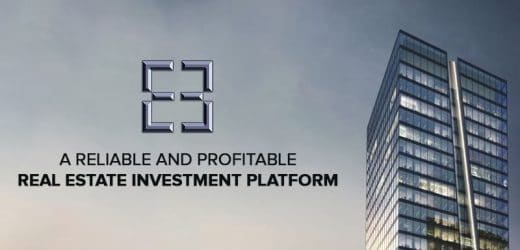
Blockchain real estate. Several industries have lately discovered the sheer amount of positive utility the blockchain technology into their space. One of those industries happens to be the real estate industry. Real estate remains the largest asset class in the world. As per Fortune, London-based real estate advisor Savills tallied up the value of all global property, including commercial and residential property and forestry and agricultural land. By their calculations, the total global real estate valuation comes a whopping $217 trillion total, and residential property makes up about 75% of the total value.
Note: These figures were calculated back on 26 January 2016.

Yolande Barnes, head of Savills world research, said, “To give this figure context, the total value of all the gold ever mined is approximately US $6 trillion. This sum pales in comparison to the total value of developed property by a factor of 36 to 1.”
There was a critical conclusion that Savills made from their study. As Barnes puts it, “Real estate is the pre-eminent asset class which will be most impacted by global monetary conditions and investment activity and which, in turn, has the power to most impact national and international economies.” In simple terms, real estate has and will continue to play a huge role in the global economy.
However, as with most traditional legacy businesses, some issues are severely affecting the real estate industry. Let’s look at some of these pain points.
The Biggest Problems with the Traditional Real Estate Industry
#1 Not open to everyone
Real estate has long been the investment choice of the rich. Very few assets manage to provide the same degree of passive income and capital appreciation. The problem is that the barrier of entering the real estate market has always been extremely high. These barriers could be citizenship, international bank accounts, Credit Score, financing, cash requirements, accreditation, and having accessibility to the right sponsors and fund managers.
If you are planning to invest in another country, you will have to make at least one international trip and to visit the property. You will have to spend a lot of time and go through several middlemen to invest in the property of your choice.
#2 Severe lack of transparency
The Panama Papers controversy showed us the depth of corruption and dishonesty in the real estate business. A higher degree of transparency can combat corruption, tax evasion, and money laundering. According to the United Nations, $800 billion – $2 trillion USD is laundered globally every single year. A significant amount of it is laundered through real estate. The UN Office on Drugs and Crime estimated this figure to be in the region of $1.6 trillion in a single year.

To understand why this is a big problem, think about this – According to Global Financial Integrity, almost 80% of the estimated $1 trillion which leaves developing countries in these illicit financial flows, could be taxed to provide revenues for public spending on global challenges such as infrastructure and climate change.
#3 High fees
If you are investing in international real estate then here are some of the fees that you will have to pay – exchange fees, transfer fees, broker fees, attorney fees, taxes, investment fees, etc. Because of the sheer number of middlemen involved, foreign real estate investment can be an expensive process. Also, you need to keep in mind that you will need to consult lawyers and accountants as well to make sure that your tax returns are in order.
#4 Lack of Liquidity
Now we come to one of the most significant problems with real estate. They are notoriously difficult to liquidate. Liquidity is defined as how quickly an asset or investment can be converted into cash. The reasons why real estate isn’t as liquid as crypto is because:
- Cryptocurrencies can be listed on a public exchange and sold quickly in open hours.
- The number of buyers for crypto is a lot more than for real estate.
Liquidity of an asset is directly proportional to the supply of the buyers. The problem with real estate buyers are:
- Firstly, the barrier for entry is very high when it comes to real estate.
- They aren’t looking to buy any property which is far away from where they live (except in the case of international real estate.)
- Real estate dealings have loads of third parties involved so the transactions are bogged down by fees and regulations. This discourages potential buyers.
- Even if you do find some buyers, you will be locked up in a lengthy transaction process, and the chances are high that it will end in failure.
#5 Pricing Commitments
Real estate investment requires a lot of capital up front. More often than not, investors have to look at expensive alternative methods of financing. Also, when it comes to international real estates, having an excellent credit score in your native country, won’t carry over to the country that you want to invest in.
#6 Transaction Speed
Like we have mentioned multiple times, real estate transactions can be extremely slow. According to Juwai Chinese Consumer International Travel Survey, 56% of Chinese investors spend over one year finding their ideal US investment property. In general, it can take you six months to find a property and another six months to fulfill all the formality needed to acquire it.

Keeping all these factors in mind, you can see why the real estate industry is prime for disruption. This is where the blockchain comes in.
Blockchain Real Estate
A blockchain is, in the simplest of terms, a time-stamped series of immutable record of data that is managed by a cluster of computers not owned by any single entity. Each of these blocks of data (i.e. block) are secured and bound to each other using cryptographic principles (i.e. chain).

The three main properties of the blockchain are:
- Decentralization: All the data that is stored inside a blockchain is not owned by one single entity.
- Transparency: All the data that is stored inside the blockchain can be seen by everyone who is part of the network. Every single piece of data can be traced right to its very origin.
- Immutable: All the data that is inside the blockchain cannot be tampered with because of cryptographic hash functions.
The blockchain brings in several utilities into the real estate ecosystem, chief among them being:
- Smart Contracts
- Tokenization
Smart Contracts
Smart contracts are automated contracts. They are self-executing with specific instructions written on its code which get executed when certain conditions are made. Smart contracts are a series of instructions, written using the programming language “solidity,” which works using the IFTTT logic aka the IF-THIS-THEN-THAT logic. If the first set of instructions are done then execute the next function and after that the next one and keep on repeating until you reach the end of the contract.
The best way to understand that is by imagining a vending machine. Each step that you take acts like a trigger for the next step to execute itself. The most important part of this entire interaction is that you (the buyer) is contacting directly with the vending machine (the supplier). At no point are you dealing with a shopkeeper (a middleman.)
Plus, remember that smart contracts are created on a blockchain, which makes the contracts immutable and transparent (unless privacy features are used). Let’s go through the major benefits that smart contracts can offer.
Benefits of smart contracts
- The most obvious benefit is that it will cut off all the middlemen. Imagine how much money you can save by cutting out all the brokers, banks, and lawyers. With them not collecting their standard 2-5% cuts, you will be saving up a small fortune.
- Smart contracts will also considerably speed up real estate transactions. LIke we have mentioned before, real estate transactions can take months on end, and that is mainly because of the vast amount of bureaucracy, middlemen, and lack of transparency that you need to go through.Realistically speaking, smart contracts will not wholly remove local government regulations, however, it will eliminate middlemen, as mentioned above.Plus, all the various data regarding the property can be saved as a hash file within the blockchain. If you are interested in knowing more about a particular property, you can exploit the blockchain’s transparency to trace all the information you need. Imagine how much time that will save as opposed to the more traditional middle-man approach.
- Finally, smart contracts can protect owners from property fraud. It is possible to link the digital ownership of your property, documents, and contracts directly to the blockchain. Once inside the blockchain, it is impossible for it to be tampered with or altered.The governments of Andhra Pradesh and Telangana in India are using the blockchain technology to fight against property fraud. We have covered this in detail here.
Tokenization
According to Wikipedia, “Tokenization, when applied to data security, is the process of substituting a sensitive data element with a non-sensitive equivalent, referred to as a token, that has no extrinsic or exploitable meaning or value. The token is a reference (i.e. identifier) that maps back to the sensitive data through a tokenization system.”

In simple terms, a token is a digital representation of a real-world asset, value, or function. One of the most exciting use-cases of blockchain technology is that it helps in the tokenization of real-world assets. This tokenization will not only increase the liquidity of traditionally illiquid assets, but it will also make it possible to trade those assets without a third-party. Think about it, instead of buying a property, you are buying simple tokens from an exchange.
Does this seem a little too far-fetched to you? Well, according to the World Economic Forum, in the next ten years, 10% of the world’s GDP will be stored in crypto assets. That’s $10 trillion worth of assets stored as tokens.
Deeper insight into tokens
Tokens in the blockchain space usually fall under three categories:
- Payment Coins: These are the “cryptocurrencies” that we are all familiar with. Bitcoin, Litecoin, Ethereum, etc. can be used as currency both inside and outside their platform.
- Utility Tokens: Tokens which fulfill a particular utility or function in their platforms are called utility tokens. Utility tokens can give holders a right to use the network and/or take advantage of the network by voting within the ecosystem. Golem’s GNT is an example of a utility token.
- Security Tokens: A token which derives its values from an external, tradeable asset is called a security token. These are subject to federal securities and regulations. This is the category which will be used to tokenize real-estate.
Fractional Ownership via Tokenization

One of the most interesting outcomes of tokenization is fractional ownership. This is especially intriguing when it comes to expensive assets like real-estate. Instead of one person owning one property, it can be possible for multiple people to buy tokens of the property and co-own the building.
To understand how this will work, let’s take a hypothetical example.
An average Malibu beach house costs ~$650,000, which is out of the budget for most people. However, suppose the seller tokenizes the house. After that, five people each $130,000 worth of these tokens each and jointly own the house. When the transaction is complete, these five enter a multi-signature smart contract based on the ownership of the house.
A multi-signature smart contract will ensure that whatever decision is taken with respect to the house is agreed upon by a majority of the owners. Since the contract is self-executing and enforceable, it will not require any supervision and will force the joint-owners to be honest.
Advantages of tokenizing real estate
- Fractional Ownership decreases barriers to entry by a staggering amount. Real estate doesn’t need to be the playground for the rich anymore. Instead of saving up and taking loans to buy one expensive asset, you can simply buy one-fifth of that asset. A multisignature smart contract will make sure that the joint owners adhere to honest conduct.
- Tokenization increases liquidity by a considerable margin. Instead of waiting forever to sell your property, you can go to an exchange and liquidate your tokens.
- It allows for greater portfolio diversification and risk reduction. Instead of locking up all your money in one single property, you can use the same money to buy fractions in multiple properties.
How Will Blockchain Change Real Estate?
The blockchain technology will allow for the democratization of real estate properties. It will open up the gates for potential investors from across the world to try their hand in real-estate investment. If executed properly, then this can be hugely beneficial for the crypto-space as well, because it will increase the real-life utility of tokens. The scary part is that we have just scratched the surface of what could be possible via the marriage of blockchain and real-estate. Hopefully, we will see more exciting use-cases soon.
For more details about the ELAD NETWORK project, please visit the link below:
AUTHOR:
BITCOINTALK ID NAME: tayo234
- Eth: 0xF1E868d28b5D84f22c174351E1e3fDBEF8e1Ec12








0 Komentar